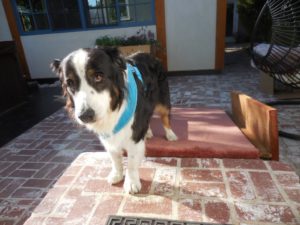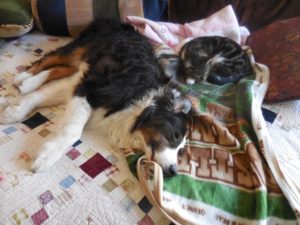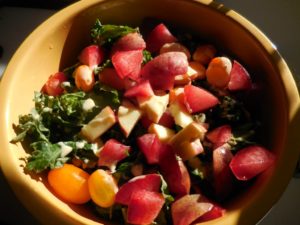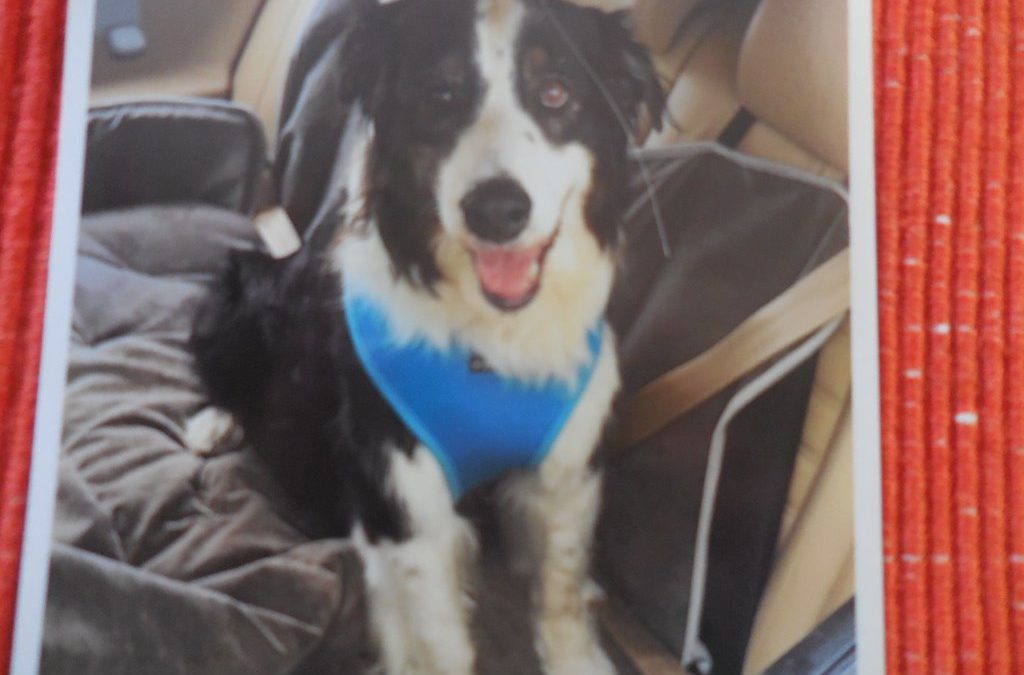Many of us are “living in chaos” – caring for elder animals, elder parents, special needs children, loved ones who have Alzheimer’s, cancer, and a myriad of life-threatening or debilitating illnesses.
The needs of these loved ones impose a kind of chaos into our lives when they have a loss of mobility, sight, hearing, continence, cognition.
They often need close supervision, which can erode one’s ability to maintain his or her own schedule of self-care.
We might experience sleep deprivation, extreme stress and worry, anxiety, depression, and exhaustion.
We are swept up in caring for the needs of the “other,” often feeling out of control and out of balance.
I, myself, am dealing with the aging of my beloved 14 ½ year old Australian Shepherd, Brutie. He has lost some peripheral vision and 80 % of his hearing. He has increased arthritis in his legs and hips and needs assistance with stairs, getting into the car, and onto raised furniture.
Sometimes he is confused and will get stuck in corners of the house. Sometimes he has “potty accidents” in the house – if he can’t get outside quickly enough.
He wakes up earlier than before (around 6:00 am) and needs to go for his walk. He sleeps more frequently and longer during the day and may be restless during his nighttime sleep.
All of these changes are normal to the aging process and may be familiar to you. My baby has become a little old man.
In order to maintain my “inner balance” I have come up with the following strategies, which might be helpful to you:
 Safety-proof your house and yard. I have added carpet runners along his normal pathways, to give him more traction and stability on our hardwood floors. I have removed unnecessary furniture where he could get stuck. I have added a futon in front of his bed in the bedroom – to catch him when he is restless in the night. I have turned a redwood gate into a ramp with carpet – so that he can easily access the backyard for “potty and recreation.” This has given him a big boost in self-esteem and independence, which are so important to counteract his other losses. The ramp has been a game-changer!
Safety-proof your house and yard. I have added carpet runners along his normal pathways, to give him more traction and stability on our hardwood floors. I have removed unnecessary furniture where he could get stuck. I have added a futon in front of his bed in the bedroom – to catch him when he is restless in the night. I have turned a redwood gate into a ramp with carpet – so that he can easily access the backyard for “potty and recreation.” This has given him a big boost in self-esteem and independence, which are so important to counteract his other losses. The ramp has been a game-changer!
- Establish a structure and routine throughout the day – for his walks, meals, naps, and his alone time. This structure allows me to know when I get my “own time:” for yoga, writing, housework, gardening, accounting, clients, time away from the house. Never underestimate the value of structure and routine! It establishes order – even in chaos – which gives everyone a sense of stability, security, and sanity.
- Make peace with this phase of your life. Older animals and family members cause us to slow down and appreciate the joys of the moment. I have learned to savor each day as a gift. We laugh, play, nap together. We take long, slow walks – enjoying our neighborhood, other animals, and the people we meet along the way. We garden together, listen to soothing music, and have special meals. Brutie is still my very best friend and people cannot resist him. He makes them smile and they can’t resist petting and talking with him.
 Rest when you can, go to bed early, and ask for help when you need it. Exhaustion will decrease the functioning of your immune system and sleep deprivation causes problems with mood stability and cognition.
Rest when you can, go to bed early, and ask for help when you need it. Exhaustion will decrease the functioning of your immune system and sleep deprivation causes problems with mood stability and cognition.
- Maintain a clean and orderly house – which soothes, inspires, and comforts everyone in the family. Cleaning house is a wonderful way to release stress and anxiety and helps us regain a sense of “order in the chaos.” We can’t control the changes in our loved ones, but making a cozy house is something we CAN control. And when you do it, your own body will reward you with endorphins and mood enhancing chemicals. If you don’t have the energy to do it yourself, try to hire someone or get a friend or family member to help you out once a month.
- Make time for activities that give you joy and replenish your spirit. Your spirit is the strongest part of your “four-part person.” When you strengthen your spirit, you will also strengthen your emotional stability, your optimism, your flexibility, your mind, and your body. Laughter and joy replenish your internal reservoir, blessing you and those around you.
- Keep on top of your financial and medical responsibilities. When you are a caretaker, it is all too easy to forget or postpone these important tasks – often resulting in costly penalties or medical, vision or dental problems that could have been avoided.
 Make sure that you and those you care for eat healthy food. When life is rough and you are feeling anxious or depressed, there is a great temptation to eat “comfort” food: sweets, fried food, sugar, white flour, fast food, sodas. These foods give you a temporary high, but they do not provide the important nutrients your body needs to support your immune system and brain functioning. Take the time to prepare or buy lots of vegetables, fruits, lean protein. Quinoa is a member of the cruciferous family and provides 8 times the protein of grain. Juicing is a wonderful way to absorb rich micronutrients.
Make sure that you and those you care for eat healthy food. When life is rough and you are feeling anxious or depressed, there is a great temptation to eat “comfort” food: sweets, fried food, sugar, white flour, fast food, sodas. These foods give you a temporary high, but they do not provide the important nutrients your body needs to support your immune system and brain functioning. Take the time to prepare or buy lots of vegetables, fruits, lean protein. Quinoa is a member of the cruciferous family and provides 8 times the protein of grain. Juicing is a wonderful way to absorb rich micronutrients.
Likewise, your aging pets need a special, healthy diet. For Brutie, I prepare ground turkey and ground lamb meat balls that are mixed with quinoa, grated carrots, and apples. At breakfast he also gets goat yogurt, bananas, baked yams, and a can of sardines – plus Omega 3 and Ester C.

